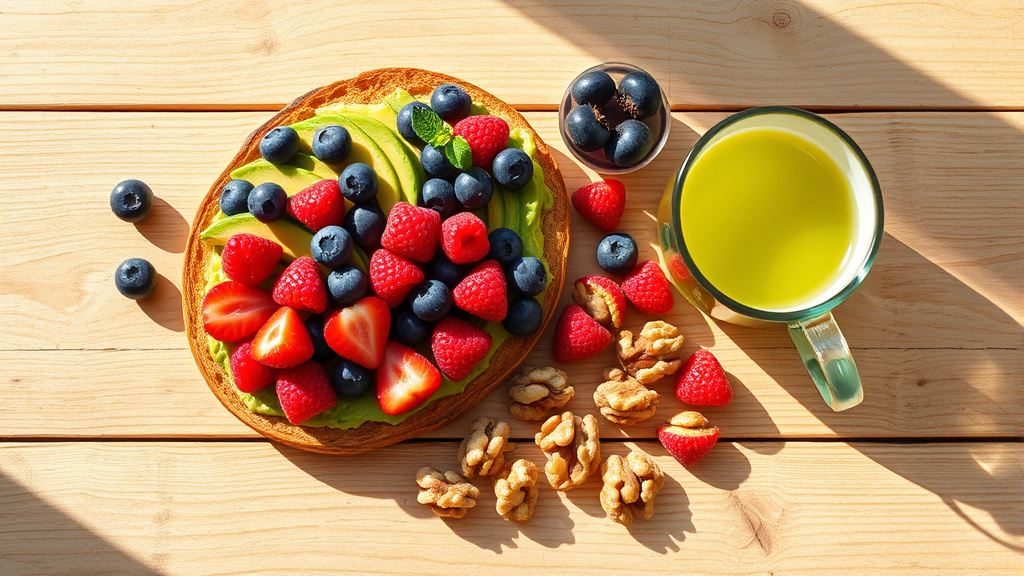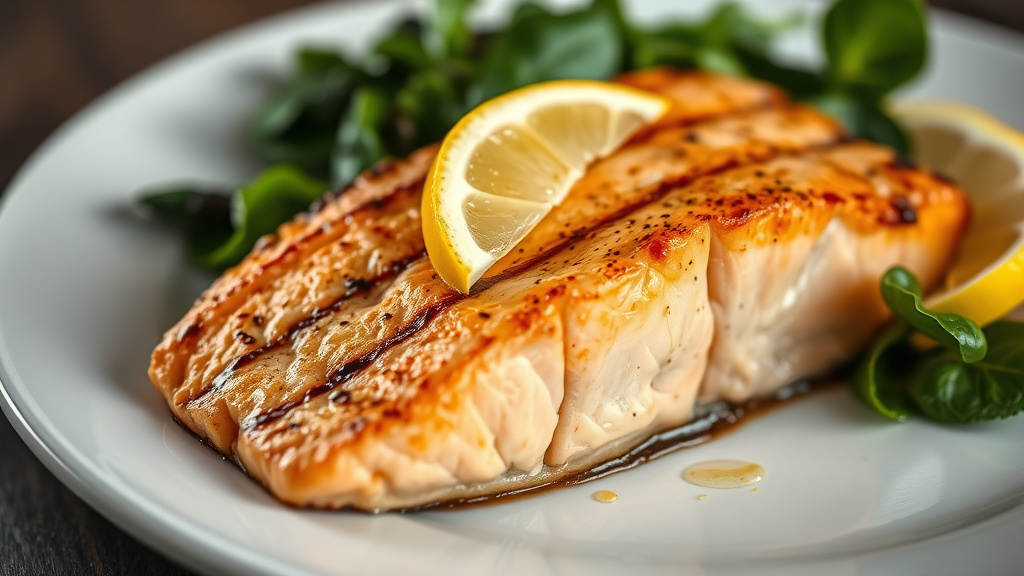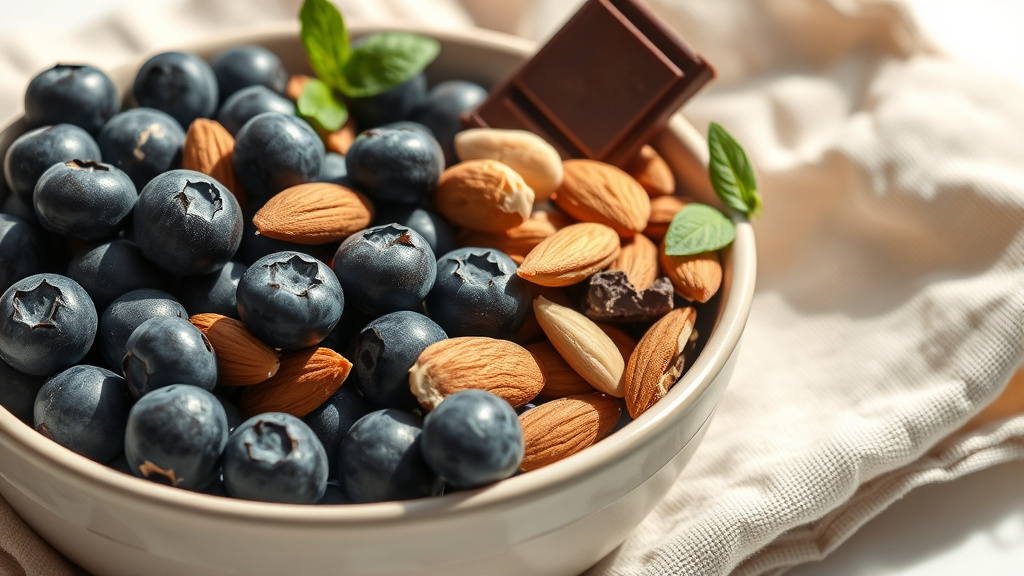Feed Your Mind: Foods That Boost Brain Health (2025 Guide)
In our fast-paced, demanding lives, maintaining peak cognitive performance often takes a backseat to daily responsibilities. Yet, what we consume plays a crucial role in how our brains function, adapt, and repair. The concept of foods that boost brain health is gaining increasing attention among health-conscious individuals striving for mental clarity, focus, and resilience. Nutrients like healthy fats, antioxidants, and neuroprotective compounds are central to this endeavor, supporting everything from memory retention and concentration to long-term neuroplasticity. Incorporating these brain-boosting nutrients into your diet isn’t just about immediate mental sharpness—it’s about fostering a foundation for lifelong cognitive vitality.

Nutrient-rich foods fuel your brain and improve focus.
Understanding how diet influences mental focus and overall brain function reveals the profound impact nutrition has beyond physical health. Certain foods are rich in antioxidants that combat oxidative stress—one of the primary culprits behind cognitive decline—while others provide essential fats that promote blood circulation to the brain and facilitate brain cell repair. The best foods for brain function often include omega-3 rich foods like fatty fish, berries packed with polyphenols, and leafy greens loaded with vital nutrients. Developing a diet for cognitive health isn’t merely a matter of choosing the right foods but crafting a balanced, sustainable eating pattern that ensures optimal nutrient absorption, supports mental well-being, and boosts neuroplasticity over time.
Why Nutrition is Key to Brain Health
The Brain’s Nutritional Needs
The brain, although constituting only about 2% of our body weight, consumes approximately 20% of our daily energy intake. This high demand underscores the importance of providing it with the right brain-boosting nutrients. Omega-3 fatty acids, B vitamins, antioxidants, and complex carbohydrates are essential for maintaining neural efficiency, supporting synaptic plasticity, and facilitating neurogenesis— the growth of new brain cells. These nutrients help in protecting the brain from oxidative stress, reducing inflammation, and promoting healthy blood flow, which is fundamental for cognitive performance. A deficiency in these vital nutrients can manifest as memory lapses, decreased focus, and mood swings, emphasizing the need for a diet rich in specific, brain-friendly foods.
Furthermore, the individual variability in nutrient absorption and metabolism means that personalized nutrition strategies can significantly impact cognitive health. For instance, individuals with higher demands for mental focus—such as students or professionals in high-stakes environments—benefit from a carefully curated diet that prioritizes nutrient-dense foods. Incorporating fatty fish like salmon, which is rich in omega-3s, or adding a handful of nuts and seeds can boost your mental clarity and resilience. In essence, understanding and meeting the brain’s nutritional needs is a cornerstone of optimizing mental performance and safeguarding cognitive longevity.
How Diet Impacts Memory and Focus
Diet directly influences the functioning of neurotransmitters—chemical messengers responsible for transmitting signals across the brain—and supports neuroplasticity, which is how our brains adapt and learn throughout life. Consuming foods rich in antioxidants, such as berries and dark green leafy vegetables, can mitigate oxidative damage to neurons. This protection is vital for memory preservation and preventing age-related decline. Additionally, blood circulation to the brain, nourished by healthy fats and proper hydration, ensures that oxygen and nutrients efficiently reach brain tissue, enhancing mental focus and clarity.
When you implement a diet rich in best foods for brain function, you’re effectively creating an environment that favors cognitive optimization. For example, complex carbs from whole grains help sustain steady glucose levels—our brain’s primary energy source—preventing fatigue and inattentiveness. Nutrients like folate and vitamins B6 and B12 aid in the production of neurotransmitters such as serotonin and dopamine, which govern mood, motivation, and focus. Consistently, evidence suggests that dietary patterns emphasizing nutrient-dense, whole foods foster better learning, improved concentration, and greater memory retention, making diet a foundational element of mental well-being.
The Role of Antioxidants and Healthy Fats
Antioxidants are crucial in neutralizing free radicals—unstable molecules that cause oxidative stress, leading to cell damage and cognitive decline. Foods rich in antioxidants such as berries, brightly colored fruits, and dark chocolate have been shown to protect brain cells from degeneration and inflammation. Polyphenols found in these foods also enhance brain-derived neurotrophic factor (BDNF), a protein that supports neuron growth and synaptic plasticity.
Healthy fats, especially omega-3s found in fatty fish like mackerel and sardines, play a vital role in maintaining blood circulation to the brain. These fats are integral to the formation of cell membranes and facilitate communication between neurons. Moreover, they exhibit neuroprotective properties, reducing the risk of cognitive impairments and supporting brain cell repair. Incorporating omega-3 rich foods into your diet—either through oily fish, flaxseeds, or supplemented options—can significantly sharpen your mental focus and improve overall brain health, aligning with the goal of creating a sustainable diet for cognitive health.
Top Foods That Boost Brain Health
Fatty Fish (Salmon, Mackerel, Sardines)

Fatty fish are rich in omega-3s, essential for brain performance.
Fatty fish are among the most potent brain-boosting nutrients sources known for their high omega-3 fatty acids content. These healthy fats are integral to maintaining cell membrane fluidity, promoting efficient neurochemical communication, and reducing inflammation. The omega-3 EPA and DHA found in salmon, mackerel, and sardines are specifically linked to improved memory, mood regulation, and cognitive flexibility. Regular consumption of fatty fish has also been associated with a slower rate of cognitive decline in aging populations, making it a cornerstone of any diet for cognitive health.
Incorporating these fish into your weekly meal plans not only elevates your intake of essential fats but also boosts your overall metabolic health, which indirectly benefits brain function. For vegetarians or those with fish allergies, incorporating omega-3 supplement
Berries and Antioxidant-Rich Fruits
Berries—such as blueberries, strawberries, blackberries, and raspberries—are packed with antioxidants, particularly flavonoids, which cross the blood-brain barrier and exert neuroprotective effects. These fruits combat oxidative stress, stimulate neuron growth, and enhance neural signaling pathways critical for learning and memory. Several studies indicate that berries may improve mental focus in both children and adults, as well as slow age-related cognitive decline.
The versatile nature of berries means they can be seamlessly integrated into smoothies, oatmeal, or simply enjoyed as a snack. Their rich nutrient profile boosts brain-boosting nutrients and protects against neurodegenerative diseases. Furthermore, antioxidants support blood circulation to the brain, ensuring neurons receive the oxygen and nutrients necessary for optimal function. Making berries a daily staple—a key best food for brain function—can significantly enhance your cognitive vitality over time.
Nuts and Seeds for Cognitive Support
Nuts—such as walnuts, almonds, and hazelnuts—and seeds like chia, flaxseeds, and sunflower seeds are concentrated sources of healthy fats, vitamin E, and polyphenols. Walnuts, in particular, are often dubbed “brain food” because they contain high levels of DHA, a type of omega-3 fatty acid. These compounds support brain cell repair, improve cognitive performance, and protect neurons from oxidative damage.
Nuts and seeds are also rich in vitamin E, an antioxidant linked to a decreased risk of cognitive decline with aging. Regular consumption can enhance working memory and processing speed. They make excellent snacks to keep at your desk or to add crunchy texture and nutrient density to salads and yogurt. These nutrient-dense foods also promote blood circulation to the brain, ensuring optimal delivery of oxygen and nutrients—crucial for sustained mental focus and energy. Incorporating a handful of nuts and seeds daily is an easy, effective way to support long-term cognitive health.
Dark Leafy Greens
Dark leafy greens like spinach, kale, collard greens, and Swiss chard are excellent sources of vitamins, especially folate, vitamin K, and lutein. These nutrients contribute to neuroprotection, reduce inflammation, and support neuroplasticity—the brain’s ability to adapt and learn. The high antioxidant content in greens also combats oxidative stress, which damages neural tissue over time.
These greens can be incorporated into salads, smoothies, or sautés, making them easily accessible and versatile. Their nutrient profile not only supports brain cell repair but also enhances the efficiency of nutrient absorption essential for maintaining overall neural health. As part of a balanced diet for cognitive health, regularly consuming dark greens can help preserve memory and executive function, especially as we age.
Whole Grains and Healthy Carbs
Whole grains such as oats, quinoa, brown rice, and barley are excellent sources of complex carbohydrates, which provide a steady release of glucose—the brain’s primary energy source. Unlike refined grains, whole grains contain fiber and essential nutrients that sustain mental clarity, improve focus, and regulate mood.
Including these in your meals can prevent blood sugar spikes and crashes, which are often associated with irritability and fatigue. Whole grains also supply B vitamins and antioxidants that further support cognitive performance. They form the backbone of a brain-friendly diet, offering sustained energy for optimal mental functioning throughout the day.
Essential Nutrients for Brain Function
Omega-3 Fatty Acids
The cornerstone of brain-boosting nutrients, omega-3 fatty acids are fundamental for maintaining the integrity of neuronal membranes, promoting blood circulation to the brain, and facilitating neuroplasticity. Found predominantly in fatty fish
Research consistently shows that omega-3s improve mental focus, reduce symptoms of depression, and may protect against age-related cognitive decline. Prioritizing omega-3 rich foods is an essential aspect of a targeted diet for cognitive health, supporting both short-term mental agility and long-term brain resilience.
Vitamins B6, B12, and Folate
Vitamins B6, B12, and folate are vital for production of neurotransmitters, DNA synthesis, and brain cell metabolism. Deficiencies in these vitamins are associated with cognitive deficits, mood disorders, and increased risk of neurodegenerative diseases.
Foods rich in B vitamins—such as lean meats, eggs, dairy, and leafy greens—should be incorporated into your daily routine. Ensuring adequate levels of these nutrients helps preserve brain health, supports healthy blood circulation, and enhances nerve function. Supplementing with B-vitamin complexes can also boost mental clarity and energy, especially in populations at risk of deficiency.
Antioxidants and Polyphenols
Antioxidants neutralize free radicals, reducing oxidative stress that accelerates brain cell aging and degeneration. Polyphenols—plant compounds with potent antioxidant properties—are abundant in berries, dark chocolate, and green tea.

Antioxidants protect brain cells from oxidative stress.
Research highlights their role in increasing levels of brain-derived neurotrophic factor (BDNF), which fosters neuroplasticity and efficient neural connectivity. Regularly consuming antioxidant-rich foods supports a healthy environment for neurotransmitter synthesis and brain cell repair, leading to improved memory and focus.
How to Create a Brain-Healthy Meal Plan
Daily Food Balance for Cognitive Health
Designing a brain-boosting diet requires an emphasis on variety and balance. Prioritize a colorful plate packed with omega-3 fatty acids, antioxidants, fiber, and essential vitamins. For example, start your day with oatmeal topped with berries and chia seeds, enjoy a Mediterranean-style salad with leafy greens and grilled fatty fish, and snack on nuts and fruit throughout the day. Hydration is equally critical—water and herbal teas aid in maintaining optimal blood flow and nutrient delivery to the brain.
Over time, this balanced approach fosters a sustainable diet for cognitive health, providing the necessary foundation for mental clarity and emotional stability. Incorporating meal prep strategies and mindful eating can further reinforce healthy habits and reduce reliance on processed, nutrient-poor foods.
Smart Snacking for Focus
Snacks matter more than many realize in maintaining mental focus and preventing energy dips. Choose nutrient-dense options like walnuts, Greek yogurt with berries, or sliced vegetables with hummus. These choices supply brain-boosting nutrients and sustain glucose levels without spiking insulin, avoiding “sugar crashes” that impair cognition.
Pre-planning snacks to include antioxidant-rich fruits, seeds, and healthy fats can make a significant difference in daily mental performance. The key is moderation—mindful eating supports not only cognitive function but also overall well-being.
Hydration and Brain Performance
Dehydration negatively impacts concentration, memory, and mood. Drinking adequate water throughout the day ensures optimal blood circulation, aiding in the transport of oxygen and nutrients to brain tissue. Complement hydration with herbal teas high in antioxidants, such as green tea, which further boosts cognitive performance.
Staying well-hydrated combined with a nutrient-rich diet unlocks the full potential of foods that boost brain health. It is an indispensable component of any effective strategy to sustain focus, mental clarity, and emotional stability.
FAQs About Foods That Boost Brain Health
Which fruit is best for brain function?
While many fruits offer benefits, berries—especially blueberries—stand out due to their high levels of flavonoids, antioxidants, and polyphenols that support mental focus and neuroprotection. Their capacity to enhance synaptic plasticity and reduce oxidative stress makes them a top choice in the mainstream diet for cognitive health.
How much fish should I eat weekly for brain health?
It is generally recommended to consume at least two servings of fatty fish per week, providing ample omega-3 fatty acids to support membrane integrity, reduce inflammation, and bolster blood circulation to the brain. Incorporating a variety of marine sources ensures a consistent supply of these neuroprotective fats.
Can supplements replace brain-boosting foods?
While supplements such as omega-3 capsules or B-vitamin complexes can be beneficial for addressing specific deficiencies, they should not replace a nutrient-dense diet. Whole foods provide complex nutrient profiles and additional compounds that synergistically support cognitive health. Supplements are best used as complementary tools under healthcare guidance.
Conclusion
Incorporating foods that boost brain health into your daily routine is a practical and delicious way to enhance cognitive performance, mental focus, and long-term neuroprotection. From fatty fish rich in omega-3s to berries packed with antioxidants, each nutrient plays a unique role in supporting blood circulation, brain cell repair, and neuroplasticity. Developing a diet for cognitive health that emphasizes variety, balanced macronutrients, and nutrient-dense options like dark leafy greens and whole grains can dramatically impact your mental clarity and emotional resilience over time. As neuroscience continues to unveil the intricate connections between nutrition and brain function, making mindful food choices remains a powerful, accessible tool for optimal mental vitality. Explore more nutrition insights in our Nutrition Hub
